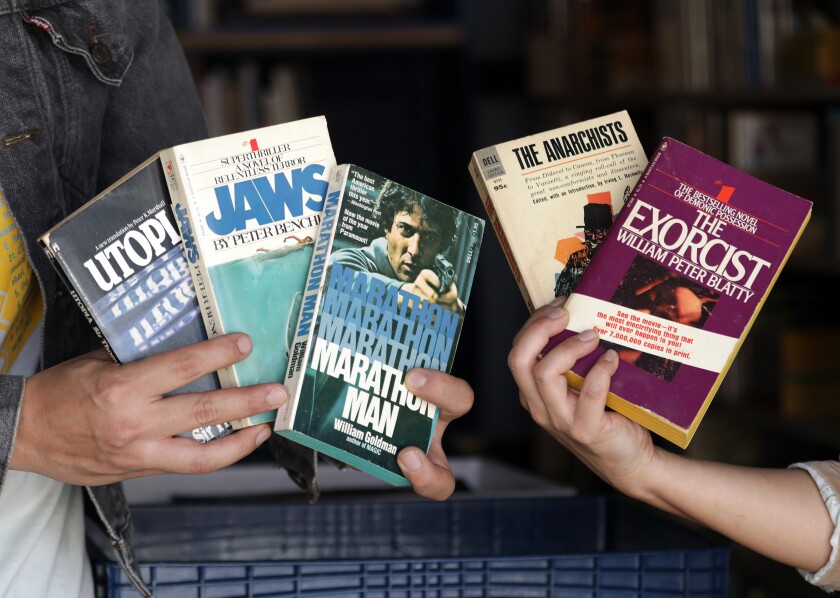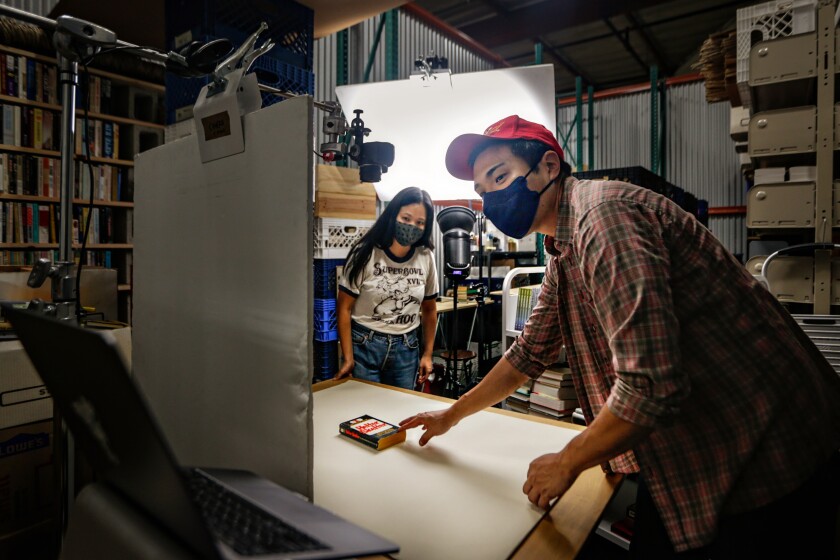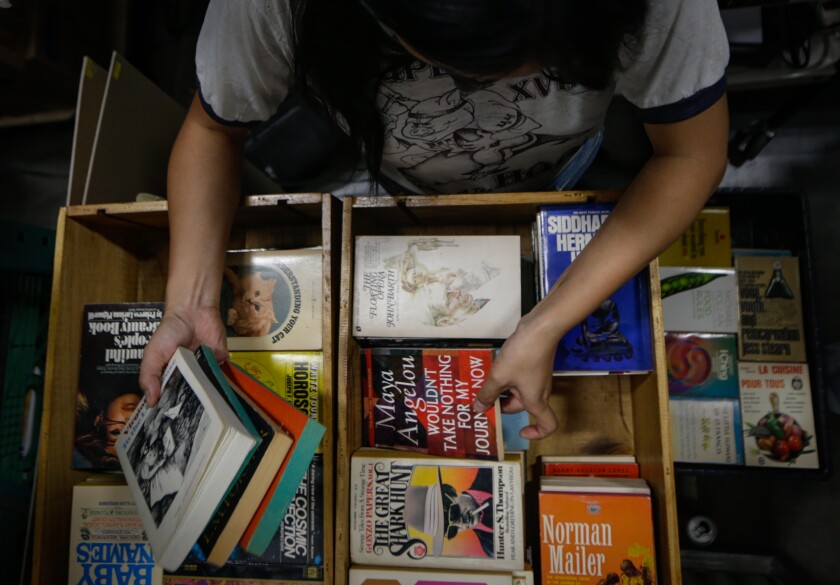On a sweltering July afternoon in South Gate, a sky blue freight truck emblazoned with Amazon Prime’s smiling arrow rolls out of the ReadySpaces loading zone. Moments later, Chris Capizzi, the 39-year-old co-founder of A Good Used Book, greets me in the parking lot of the storage facility. As we navigate the labyrinth of corrugated metal, forklifts race through the corridors like go-karts. Capizzi and his wife and business partner, Jenny Yang, 38, work quietly in a 400-square-foot space here — sorting, cleaning, cataloging, photographing, organizing and packaging as many books as two people can in a day.
“You can’t ever get away from Amazon,” Capizzi says later when the three of us convene in one of ReadySpaces’ conference rooms. It’s the lament of every bookseller, but no one has had a year as arduous, as anti-Bezosian, as A Good Used Book.
Capizzi and Yang’s business model actually emerged from a negative experience with Amazon. After failing to sell quality books through Amazon’s Fulfillment program, they conceived A Good Used Book as a roving pop-up store specializing in sharply packaged vintage paperbacks. By 2019 they had become a mainstay at several L.A. flea markets and downtown’s Grand Central Market, with wine crates full of vibrant, seldom-seen covers that readers could flip through like used records.

Some of the titles at A Good Used Book that are yet to be wrapped.
(Myung J. Chun/Los Angeles Times)
On July 30, A Good Used Book held its first pop-up since March 2020 at Verve Coffee in the Arts District, the beginning of an August residency every Friday through Monday. COVID cases are rising and indoor mask mandates have returned, but the books will be set up on Verve’s lush patio. It’s a modest but momentous reopening for a business that has been through the full pandemic wringer — plummeting sales, a hard digital pivot, unhelpful government programs, grand theft auto and even some industrial espionage.
As The Times reported in a profile last April, A Good Used Book was thriving before COVID. The couple’s rundown ’99 Chevy Astro van carried roughly 1,600 books to pop-ups around town, and they had plans to expand and purchase a second van. When it became clear that non-essential businesses wouldn’t reopen for months, however, they had to decide whether to quit or double down. Betting on their success was the hardest thing they’ve ever done.
The owners first switched to digital sales — three per week via Instagram (now scaled back to one) — trading the taxing labor of hauling thousands of books for the madness of competing in a virtual space dominated by Amazon.
“When you’re a small business, every little change is a big deal,” says Yang. “We would have to regroup, transition again. There were some days that it was really, really hard. But there were a lot of days where people came out and helped us and bought a lot of books.”
Now, as the Delta variant spreads, the future feels precarious. “The hardest part of the pandemic was not being able to see a week in advance, not being able to make plans,” Capizzi says. “Right now, right as we’re starting to feel like we can, it’s starting to look and feel a little scary.” Again.
At least now they have a fully loaded website. According to a June report from the American Booksellers Assn., sales revenue for bookstores using their proprietary e-commerce platforms were up 360% compared to the same week in 2019. Instead of using those platforms, A Good Used Book decided to go it alone.
Capizzi and Yang sold books from their backstock on Instagram at the height of the pandemic while they built the website on Shopify. But creating three sales a week on Instagram stories took days of double shifts — with copywriting and other assistance from their sole employee, Sarah Bofenkamp, who now works remotely from Washington State. Now that their website is functional, they’re still learning the best metadata and SEO practices.

Capizzi and Yang photograph their new stock of books to be placed for sale online in the South Gate storage space.
(Jason Armond/Los Angeles Times)
“The physical is so much easier because you kind of understand that people are coming from the street or to get coffee or you’re already at the flea market,” Yang explains. “But with the internet … you’re constantly figuring out these little tiny problems.”
That wasn’t the worst of it. Capizzi and Yang tried and failed to get grants, loans and unemployment checks from the government. Then, in May, someone stole the Chevy Astro, which contained the tables and crates for their pop-ups. By that point, Instagram book sales weren’t enough to cover expenses. While several brick-and-mortar bookstores started GoFundMe campaigns to stay afloat, Capizzi and Yang turned to their parents for financial aid. This year, they finally secured a disaster loan from the Small Business Administration.
Even as they struggled financially, Capizzi and Yang needed to source books for future sales and maintain vendor relationships, which meant they still had to do plenty of physical hustling. In September, they drove through the flames and smoke of the El Dorado wildfire to a storage unit in Beaumont where they sorted through grocery bags and boxes brimming with books to separate the pristine from the warped and water-logged.
Late last year, A Good Used Book serendipitously reconnected with a San Diego source whose family runs a business selling books on — where else? — Amazon. That source briefly rented a ReadySpaces storage unit in Chatsworth, which inspired Capizzi and Yang to move from their cramped U-Haul storage sheds in Atwater.
But when they arrived in Chatsworth, new Amazon-affiliated booksellers set up shop on either side of A Good Used Book. One neighbor pestered Capizzi and Yang about their San Diego vendor. Eventually, they relented, and the vendor sold the neighbor some books. Shortly thereafter, the vendor found a tracker on his car, called the police on the Amazon sellers — fearing they wanted to steal their inventory — and moved out of Chatsworth. Capizzi and Yang followed suit, relocating overnight to South Gate.
The new headquarters are a vast improvement on their old digs in Atwater Village where they’d worked by daylight with no electricity or Wi-Fi. They have more and better shelving and spaces designated for shrink-wrapping books and photographing them for web sales. Several shelves also feature the latest addition to A Good Used Book’s inventory: new books.
The new product line emerged from the other major shift of 2020, the reckoning over racism after George Floyd’s murder and the rise in attacks against the AAPI community. Searching for used books to celebrate Black History Month and Asian Heritage Month, Capizzi and Yang, who are both Asian American, were faced with the publishing industry’s historic racial prejudices. The profit margins for new books are slimmer, and purchasing them puts the company in direct competition with Amazon, but they’re committed to selling diverse books.
“For us, it was really important to have different voices and different perspectives,” Yang says. “We realized we wouldn’t have to rely on the books that we find every week and would be able to say a little bit more.”
The deal with Verve Coffee was a godsend, but it only came after months of fruitless planning for another spot. This spring, the couple had extensive talks with Grand Central Market about creating a free-standing, semi-permanent pop-up. Capizzi drew up rough plans, consulted with an architect and found someone to fabricate the structure. Ultimately, Grand Central turned them down.
Fortunately, A Good Used Book had positive meetings with Verve’s regional manager, Alexis Bolter, as well as a strong “business-mentor type” relationship with Matt Moreno, the manager of Verve’s Arts District location. Moreno describes A Good Used Book’s pre-COVID pop-ups at Verve as “mutually beneficial.” If all goes well in August, Capizzi and Yang hope to rent the vacant showroom above Verve later in the year, move the South Gate operation there and even host events. Moreno is bullish on their plans.

Yang prepares crates of new books to be displayed when A Good Used Book resumes sales at Verve Coffee.
(Jason Armond/Los Angeles Times)
“I dream of tearing down the wall that separates our space from the salon [that’s there] now and having A Good Used Book set up there to create a full-on showroom/storefront for them,” says Moreno, “so that both businesses can exist and thrive together. Who doesn’t love to sit down and read a good used book with a good cup of coffee?”
A couple of weeks before their Verve re-opening, Capizzi and Yang were cautiously optimistic. Finances and rent permitting, they’re considering a brick-and-mortar shop eventually. For now, they’re content to continue mapping the future for millennial independent booksellers.
“If we can get beaten up by COVID this much and still be optimistic coming out of the tail end-ish, I think we have a good chance of making it,” Capizzi says. “I don’t know if we’ve been through the worst, but we’ve been through some pretty bad s— …. We didn’t break up. We’re still finding books and selling them every week. And we’re still trying to make it better.”
Bell is a journalist and writer from Santa Monica.
window.fbAsyncInit = function() { FB.init({
appId : '134435029966155',
xfbml : true, version : 'v2.9' }); };
(function(d, s, id){ var js, fjs = d.getElementsByTagName(s)[0]; if (d.getElementById(id)) {return;} js = d.createElement(s); js.id = id; js.src = "https://connect.facebook.net/en_US/sdk.js"; fjs.parentNode.insertBefore(js, fjs); }(document, 'script', 'facebook-jssdk'));
For all the latest Entertainment News Click Here
For the latest news and updates, follow us on Google News.
